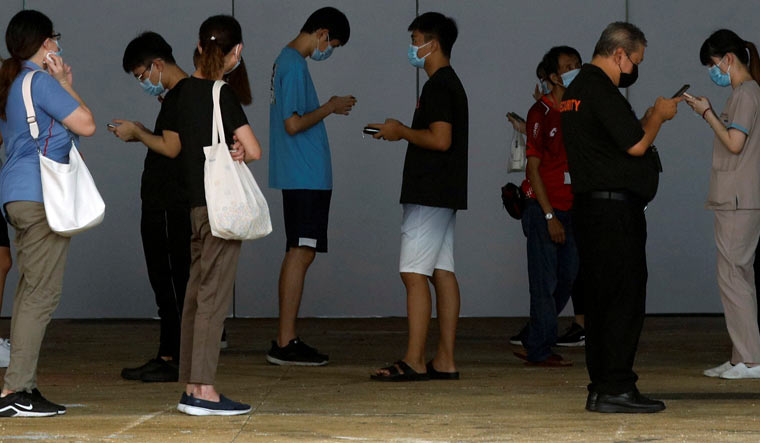Singapore is trying to arrest the COVID-19 spread following a recent spate of cases out of markets and social clubs that have derailed its plans to open and put it in an on-again-off-again mode.
The Ministry of Health (MOH) reported 92 new coronavirus cases on Sunday, including 88 locally-transmitted and four imported ones.
It is likely that rising case numbers will be reported in the coming days as Singapore steps up efforts to detect new cases to contain their spread in the community, the ministry said.
Comparatively, the MOH had confirmed zero new cases of local transmitted infection, with just six imported ones on July 10. Three of these infections were detected on arrival in Singapore and three developed the illness during isolation under Stay Home Notice (SHN).
But more infections have been reported especially from new clusters at Karaoke TV (social) clubs and from open markets among fishmongers in recent days. The local cases included 25 new cases linked to the KTV cluster on Sunday, which now stands at 173 cases, and 42 new cases linked to the Jurong Fishery Port cluster, which now stands at 63.
Overall, the number of new cases in the community has increased from 17 cases the week before to 325 in the past week. The number of unlinked cases in the community has also increased from eight the week before to 31 cases in the past week.
Noting the increase, Prime Minister Lee Hsien Loong on Sunday said these infections are a reminder of the need to get everyone vaccinated.
This is especially so for seniors who can become seriously ill if infected, he said in a Facebook post on Sunday.
"The most important way to keep ourselves safe is vaccinating everyone," said Lee, adding that Singapore is on track to reach the goal of fully vaccinating two-thirds of the population by National Day, which falls on August 9.
"Meanwhile, please keep up our regular habits of wearing masks, washing hands and maintaining safe distancing. This will slow down the spread of the virus, and help to bring outbreaks like the KTV and Jurong Fishery Port clusters under control," the prime minister said.
Authorities have also reversed its social outing decision especially the 'dining in' at eateries to two from Monday, having allowed a group of five to 'dine in' just last week with the exception of fully vaccinated people being allowed in some restaurants.
The MOH has advised visitors to the affected premises to monitor their health closely, and minimise social interactions as far as possible, for 14 days from their date of visit or interaction. They are encouraged to see a doctor immediately if they feel unwell.
"We also advise all visitors to markets and food centres to avoid crowds and to do your marketing during off-peak hours or at supermarkets, and to strictly observe the safe management measures," it said.
Even those who are vaccinated but have un-vaccinated elderly family members at home should avoid crowded places or extensive social interactions, the MOH said. This is because vaccinated persons may still get infected with the virus and inadvertently bring the virus home to seniors.
Tighter measures will be implemented to manage access to wet (open stalls) markets where COVID-19 cases were recently detected among stallholders and stall assistants, The Straits Times reported.
From Monday, interim fencing will be put up at the markets by the National Environment Agency (NEA) and town councils, and mandatory SafeEntry check-in requirements will be enforced, the MOH said. The added access control will better enable contact tracing to ring-fence cases.
Similar access controls had already been implemented at another 13 markets since the circuit breaker period last year.
Customers are not allowed to enter once the number of people in each market reaches the stipulated allowable capacity.
"This is to avoid overcrowding and ensure that effective safe distancing and enforcement can be carried out to ensure everyone's safety," said the MOH.
It said that the porous nature of wet (open stalls) markets makes contact tracing and isolation less straightforward.
"We are particularly concerned that these wet (open stalls) markets serve a range of customers, including the vulnerable elderly, some of whom remain un-vaccinated. They might be infected, and could suffer severe symptoms," it said.
ALSO READ
The MOH further urged all un-vaccinated individuals, especially the elderly, to stay at home as much as possible over the next few weeks.
It said, "We urge members of the public to reach out to your elderly relatives or neighbours who remain un-vaccinated to see what assistance they may require, for example, to buy daily necessities. With the upcoming (Hari Raya Haji - Haj) public holiday on July 20 (Tuesday), individuals should continue to limit their overall number of social gatherings to not more than two per day, whether it is to another household, or to meet with friends and family members in a public place."
As of Sunday, Singapore has reported a total of 63,073 COVID-19 cases and 36 deaths.





